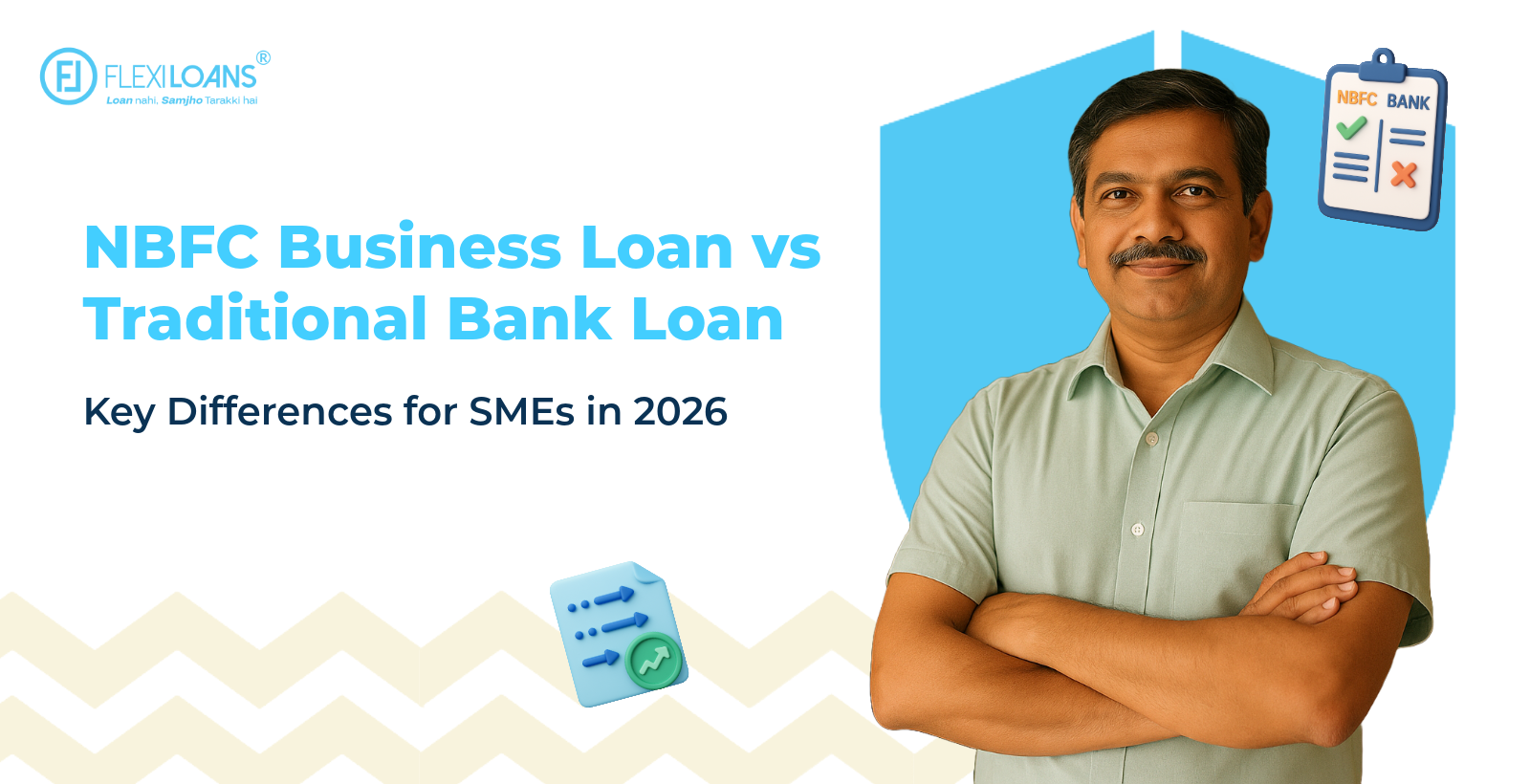Jul 09, 2024
Nov 30, 2025

In today’s competitive business environment, keeping up with technological advancements is crucial to remain ahead of the game. For many businesses, particularly those in manufacturing, construction, and agriculture, this often means acquiring new machinery. However, purchasing machinery can be a significant financial burden and this is where a machinery loan becomes a boon for businesses.
What is a Machinery Loan?
A machinery loan is a type of business loan specifically designed to finance new or used machinery and equipment. Business loans for machinery can be procured under several circumstances- for business expansion, maintenance or repair of the existing one, purchasing new ones and others. These loans provide businesses with the capital needed to acquire essential machinery without having to deplete their cash reserves. Machinery loans can be procured by a multitude of organisations including, manufacturing, agricultural, construction, industrial supplies, e-commerce and others.
This article expostulates 6 pertinent questions related to Machinery Loans that must be considered before a company apply for a business loan.
1. What are the benefits of a Machinery Loan?
One of the primary benefits of securing Machinery Loans is that it allows businesses to preserve their cash flow. Instead of paying a large sum upfront for machinery, businesses can spread the cost over time through manageable monthly payments. This helps maintain liquidity and ensures that funds are available for other operational needs. Let us understand the benefits a Machinery Loan brings for an organisation.
Preserving Cash Flow: A major advantage of securing a Machinery Loan is that it allows an organisation to maintain its cash flow. A good cash flow record opens prospects for future business loan endeavours with the possibility of expansion under desired circumstances. Preserving the cash that could be utilised for the purchase, maintenance or repair of machinery can readily be invested for other operational requirements.
Improved Productivity and Efficiency: Securing funding aids in upgrading to new machinery that can significantly enhance productivity and efficiency. Modern machinery often comes with advanced features that streamline processes, reduce downtime, and improve overall output. This can lead to increased revenue and profitability in the long run.
Tax Benefits: Businesses can benefit from tax deductions on machinery loans. Interest paid on machinery loans is often tax-deductible, reducing the overall cost of financing. Additionally, businesses may be eligible for depreciation benefits on the purchased machinery.
Competitive Edge: Having access to the latest machinery and upgrading the existing one can give businesses a competitive edge in the industry. It facilitates high-quality production of goods to meet customer demands more effectively, and stay ahead of the curve.
2. What are the documentation requirements and eligibility criteria for business loans for machinery?
Eligibility criteria for machinery loans can vary depending on the lender and the specific loan product. However, some common requirements include:
Business Age and Stability: Lenders typically prefer businesses that have been in operation for a certain period, often at least one to two years. Stable and well-established businesses are considered lower risk.
Credit Score: A good credit score is crucial for securing a machinery loan. Lenders will review the credit history of the business and its owners to assess their creditworthiness to ensure that repayments are fulfilled on time.
Financial Statements: Businesses may need to provide financial statements, such as profit and loss statements, balance sheets, and cash flow statements, to demonstrate their financial health and repayment capacity.
Business Plan: A detailed business plan outlining the purpose of the loan, the expected benefits of the new machinery, and the repayment strategy can strengthen the loan application.
In addition to this, age of the borrower ( not less than 21 years), the profitability of the business, turnover and audit reports also affect your procurement of machinery loans.
Documentations Required:
To secure a machinery loan in India, the following documents are typically required:
Identity Proof: PAN Car, Aadhar Card, Passport, Voter ID
Address Proof: Utility bills (electricity, water, etc.), Lease or rent agreement, Passport
Business Proof: Registration certificate of the business, GST registration, Business license
Financial Documents: Bank statements for the last 6-12 months, Income Tax Returns for the last 2-3 years, Audited financial statements (Balance Sheet, Profit & Loss Statement) for the last 2-3 years
Quotations/Proforma Invoice: Detailed quotations or proforma invoices from the machinery supplier
Loan Application Form: Duly filled loan application form provided by the lending institution
Photographs: Recent passport-sized photographs of the applicant
Collateral Documents (if applicable): Documents related to the collateral being offered (property papers, etc.)
There are fintech organisations like FlexiLoans that offer unsecured business loans in a completed digital process, facilitating quick issuance and disbursal of loans.
Partnership Deed/MOA & AOA: For partnership firms or companies, the partnership deed or Memorandum and Articles of Association
Business Plan: Detailed business plan outlining the use of the machinery and expected benefits
3. What Types of Machinery Can Secure Financing through Business Loans?
Machinery loans can be used to finance a wide range of equipment across various industries. Both heavy-duty and light-weight pieces of machinery can easily secure financing. Some common types of machinery that can be financed include:
Manufacturing Equipment: This includes machinery used in the production and assembly of goods, such as CNC machines, lathes, milling machines, and robotic arms.
Construction Equipment: Businesses in the construction industry can use machinery loans to finance equipment such as excavators, bulldozers, cranes, and concrete mixers among others.
Agricultural Machinery: Farmers and agricultural businesses can acquire machinery like tractors, harvesters, irrigation systems, and ploughs through machinery loans.
Medical Equipment: Healthcare providers can finance the purchase of medical equipment, including MRI machines, ultrasound devices, and other diagnostic tools.
IT and Office Equipment: Businesses can also procure machinery loans to acquire IT infrastructure, including servers, computers, and office automation systems.
4. What are the Interest Rates and Repayment Terms?
Interest rates and repayment terms for machinery loans can depend on various factors such as the terms of the lender, the borrower’s credit profile, and the loan amount. Here are some general points to consider:
Interest Rates: Interest rates for machinery loans can be either fixed or variable. Fixed rates remain constant throughout the loan term, providing predictability in monthly payments. Variable rates may fluctuate based on market conditions, potentially leading to changes in monthly payments.
Repayment Terms: Repayment terms for machinery loans can range from one year to several years, depending on the loan amount and the lender’s policies. When you are choosing a lender, make sure your repayment tenure aligns with your business’s cash flow and financial capacity.
Fees and Charges: In addition to interest, as a borrower, you should be aware of any additional fees or charges associated with the loan. These may include processing fees, prepayment penalties, and late payment fees.
5. What are some crucial parameters for securing swift disbursal of Machinery Loans?
Securing swift machinery loans can be both a need and an indication of creditworthiness. Quick issuance can help an organisation to cater to its urgent needs like replacing or upgrading their equipment quickly. The following crucial elements will guarantee a quicker loan approval procedure:
Good Credit History: Maintain a high credit score, business and personal. Creditors tend to accelerate the process if a company exhibits a higher credit history which showcases its ability to timely repayments of its business loans.
Comprehensive Recordkeeping: Keep necessary paperwork handy. Before initiating the process, the loan providers will look at important documents like identity and address proof, certificates of business registration, bank accounts, income tax records, and a thorough business plan among other things to assess your eligibility for business loans.
Financial Well-being: Make sure your company’s finances are in good shape. Strong financial statements, profitability, and good cash flow indicate business’ stability and growth potential.
Pre-Approved Loan Options: Consider lenders that offer pre-approved machinery loan options to companies with sound financial standing. With their prior assessments, these lenders may frequently issue loans more quickly.
Professional Inter-connectedness: Maintain a good professional relationship with your bank or other financial organisation. Trust and familiarity can expedite the business loan approval procedure as the lender is already acquainted with your company’s background.
6. How Do Machinery Loans Work?
Procuring Machinery loans is a pretty straightforward process. It works similarly to other types of business loans. Here is a step-by-step overview of the process:
Application: The first step is to apply for a machinery loan. This typically involves filling out an application form and providing necessary documentation, such as financial statements, business plans, and details of the machinery to be purchased, repaired or maintained.
Approval: Once the application is submitted to your desired creditor quoting the required amount, they will then review it and assess your eligibility for business loans along with the viability of the business. Factors like financial health, credit history, and repayment capacity of the business affect this process.
Disbursement: Upon approval, the required machinery loan amount is disbursed to the business, either directly to the machinery supplier or into the business’s account. The business can then use the funding for their required machinery operations.
Repayment: The lender and borrower agree to a repayment term prior to the disbursal. The business loan is either repaid through regular monthly instalments over a predetermined period or a flexible repayment tenure. The repayment schedule will include both principal and interest components. It is essential to make timely payments to avoid penalties and maintain a good credit score.
Conclusion
Machinery loans are a valuable financial tool for businesses looking to invest in new or upgraded equipment. They offer numerous benefits, including preserving cash flow, enhancing productivity, and providing tax advantages. By understanding the workings of machinery loans, businesses can make informed decisions and choose the best financing options to support their growth and success. Whether you are in manufacturing, construction, agriculture, or healthcare, a machinery loan can help you acquire the necessary equipment to stay competitive and thrive in your industry.
FAQs
Yes. FlexiLoan is a fintech company has provides quick machinery loans without collateral and limited credit history. The streamlined digital process facilitates transparency and swift disbursal. SMEs and MSMEs can secure desired loan amounts with FlexiLoans in minutes.
Strong credit history, good cash flow, organised record-keeping, and enhanced financial health are some of the key factors of consideration. By focusing on these parameters, businesses can streamline the process of securing machinery loans, ensuring timely access to the funds needed for growth and operational efficiency.
Maintain a good credit history, prepare necessary documents, ensure strong financial health, consider pre-approved loan options, and maintain a good relationship with your lender.







